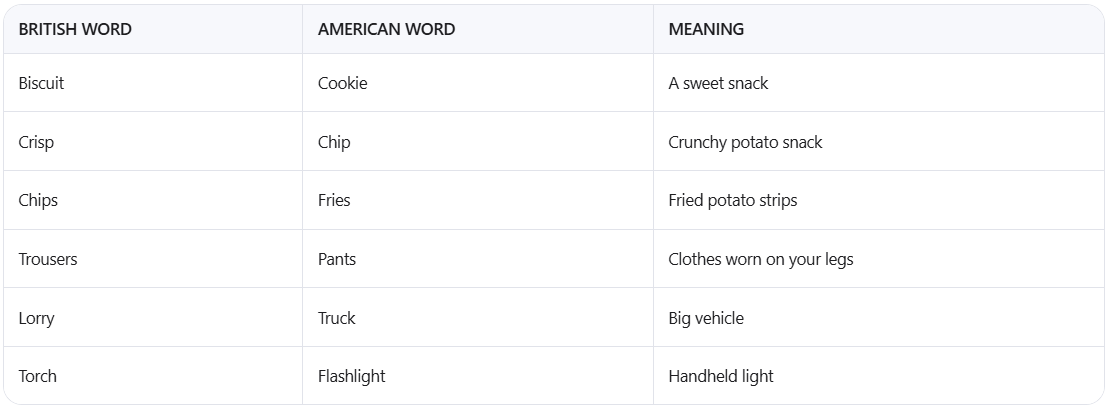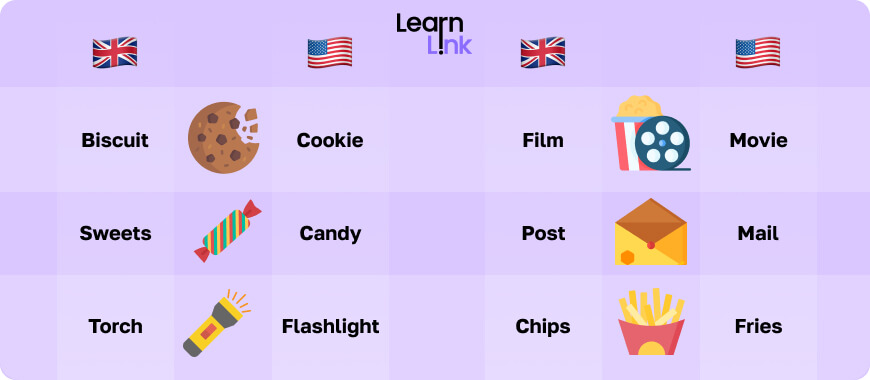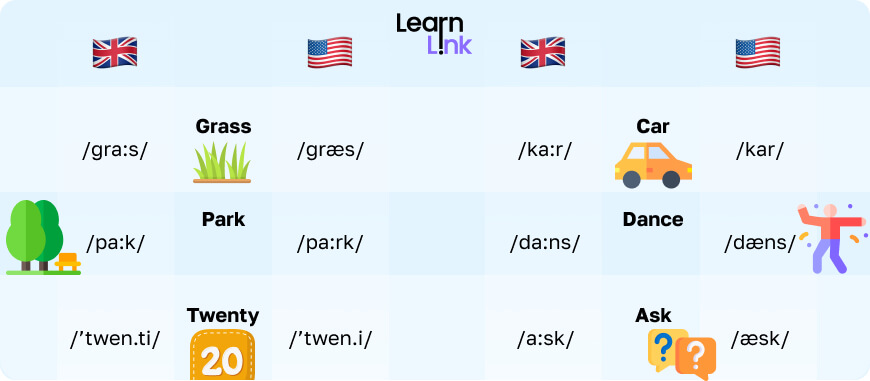English is one of the most popular languages in the world — but did you know it can sound a little different depending on where you are?
In some places, people say “flat” when they mean a home with more than one room. In others, they call it an “apartment.”
This is because there are two main ways to speak English:
- British English , which comes from the United Kingdom.
- American English , which is spoken in the United States.
Even though these versions of English come from the same place, they have grown apart over time. And now, they have their own vocabulary, spelling, grammar , and even pronunciation differences !
Let’s explore what makes them special — and why both are correct!
What Is British and American English?
You might think that if someone speaks English, they all speak it the same way — but that’s not true!
British English is the version that started in England and is now used in many countries like the UK, Australia, and New Zealand.
American English grew from British English after the United States became its own country.
Even though they share the same roots, between British and American English there are small changes in how people write, speak, and understand words.
But don’t worry — if you learn one version, you’ll still be able to understand the other. It’s like reading two books written by the same author but in slightly different styles.
Did you know that some words in both British and American English came from French or Latin? That’s why we have words like “dictionary”, “grammar”, and “language” that look similar in many languages!
Words That Sound the Same but Mean Different Things
One of the most fun things about learning English is discovering how the same word can mean something different in British or American English .
Here are some examples:

Can you imagine asking for a “biscuit” in America and getting what looks like a cracker? Or asking for “chips” in Britain and being given French fries?
These funny mix-ups happen all the time — and that’s what makes learning the differences between American and English language so interesting!
Spelling Differences
Another big difference between British English vs American English is how we spell words.
British English often keeps older spellings, while American English uses simpler ones.
Here are some common spelling variations:

So if you see an extra “u” in “favour” or “colour” , you’re probably reading British English .
And if you see only one “l” in “traveler” , then it’s likely American English .
This is one of the common differences that helps you quickly tell which version of English you're reading.
Pronunciation Differences
Do you know that the same word can sound different depending on whether a Brit or an American says it?
Take the word “dance” :
- In British English, it sounds like dahns .
- In American English, it sounds more like duhns .
Another example is the word “schedule” :
- British = shed-yool
- American = sked-ule
Also, listen carefully to how people say:
- “Tomato” – British = to-mah-to , American = to-may-to
It may sound strange at first, but once you get used to it, you’ll understand both versions easily.
If you listen to native speakers , you’ll notice that Americans prefer short vowel sounds, while Brits tend to use longer vowels . This affects how many everyday words are said.
Grammar Tips – Small Rules, Big Difference
Even grammar rules change slightly between the two versions.
Collective Nouns
In British English , collective nouns like team, family, or government can take plural verbs:
- The team are playing well today.
In American English , they usually take singular verbs:
- The team is playing well today.
This is one of the spelling and grammar differences that shows how language can vary based on where you are.
Prepositions
British English often uses “in” where American English uses “on” :
- British: I live in the street.
- American: I live on the street.
These small grammar differences are part of what makes each version unique and fun to learn.
Speak Like a Native – When to Use Which English
Now you know the main differences between British and American English — but when should you use which one?
- If you're learning English to talk with people from the UK , try using British English .
- If your goal is to talk with people from the USA , go with American English .
But guess what? You don’t have to choose one forever. Many learners use both — depending on their favourite TV shows, teachers, or friends.
Also, many apps and books will tell you whether they use British or American English , so you can pick what feels right for you.
If you want to improve your understanding of the difference between the two, try listening to native speakers or watching videos in both versions. You can also read stories and see how certain phrasal verbs or expressions are used differently.
Practice Makes Perfect
The best way to learn the differences between British and American English is to practice — and have fun while doing it!
- Listen and Repeat – Learn by Speaking
Listen to songs, watch cartoons, or play games in English. Try repeating what you hear — it helps you remember new words and how to say them correctly.
- Play Games and Learn New Words
Use apps like Duolingo, Lingokids, or ABCmouse. These let you play while learning, and you can choose between British or American English settings .
You can also play a game with a friend: try saying a word in both British and American styles and see who can do it best!
Keep Learning with Learnlink
At Learnlink , we believe learning English should be fun, easy, and full of surprises. Whether you prefer British English vs American English , our lessons and activities are designed to help kids like you grow in confidence and fluency.
With lessons that include real-life conversations, interactive games, and friendly teachers, you’ll never run out of ways to keep improving.
So next time you hear someone say “lift” instead of “elevator”, or “jumper” instead of “sweater”, you’ll know it’s just another variation of English — and now you understand the difference!
Final Thoughts
Learning about the differences between British and American English isn’t just about memorising words — it’s about discovering how language changes across cultures and countries.
Whether you’re watching a movie from London or Los Angeles, reading a book by a British or American author, or chatting with friends online, knowing these variations of English makes communication easier and more fun.
So keep exploring, keep listening, and most importantly — keep enjoying your journey through the wonderful world of English!











